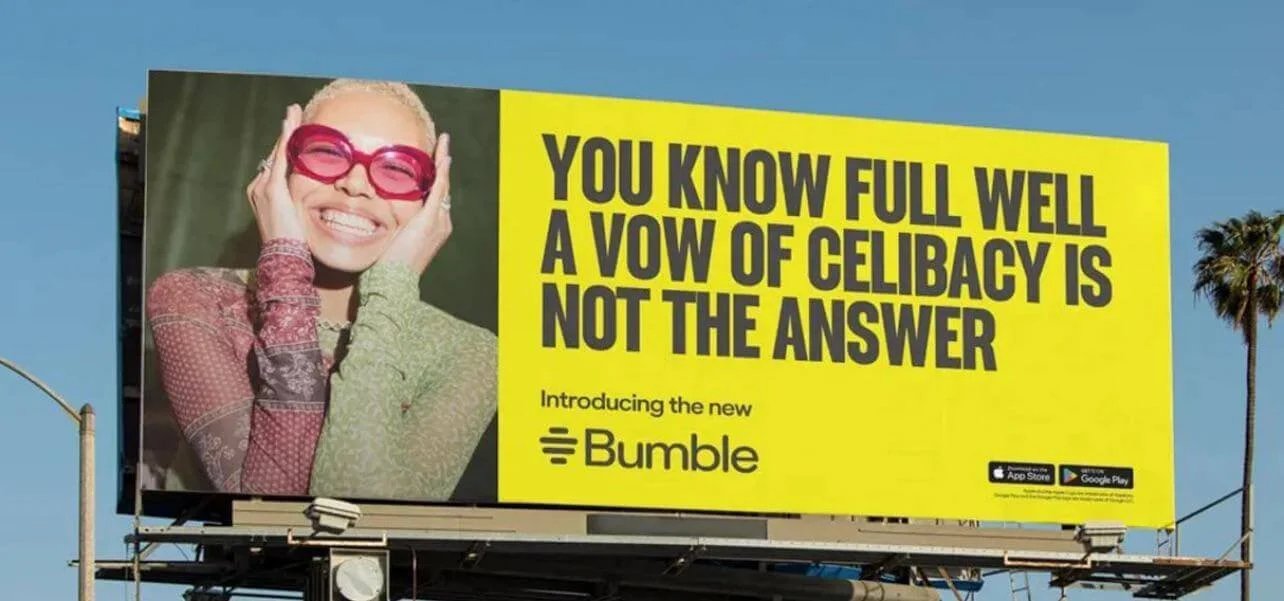Bumble’s Anti-Celibacy Backlash: A Lesson in Digital Marketing for Therapists
TL;DR
In 2024, dating app Bumble released an anti-celibacy ad campaign meant to promote sexual freedom. However, it backfired, sparking backlash for shaming women who choose celibacy.
The fallout led to lost trust, job cuts, and declining revenue.
For mental health brands, the takeaway is clear: Messaging must honor autonomy, human complexity, and lived experience.
Dating app Bumble launched an anti-celibacy campaign in 2024. It splashed the words “You know full well a vow of celibacy is not the answer” across billboards. The goal was to encourage sexual freedom. However, the ad sparked major backlash and outraged its audience. Critics said that it shamed women who were not sexually active. It also invalidated and shamed their choices.
Ultimately, the company removed the ads and apologized, but this campaign left a negative impact on its reputation. The campaign was criticized as insensitive to women, not something that a female-focused dating app wants associated with its brand.
The mistake didn’t just spark backlash; it hit the brand hard in other ways. Amid recent job cuts and declining revenue, the brand has been struggling since then.
For mental health professionals and wellness brands, this is more than a PR mistake. It’s a powerful lesson in digital marketing for therapists. There’s an important takeaway from this: messaging has to understand the complexities of the human experience. This was a case study of a brand ignoring empathy.
What Went Wrong (and Why It Matters in Digital Marketing for Therapists)
The problem with Bumble’s campaign is that it promoted celibacy as something negative. This implies that there is something wrong with people who choose celibacy. That tone alienated many, including people who are practicing celibacy for religious reasons and those who are healing from trauma or breakups. Bumble unintentionally reinforced stigma and eroded trust.
At Priceless Copy, we call this tone-deaf marketing. The messaging might grab attention, but for all the wrong reasons. Ultimately, it causes the audience to disconnect emotionally. In digital marketing for therapists, the tone matters just as much as the message.
The Human Side of Marketing: Why Empathy Is So Important
At Priceless Copy, our founder brings something most marketing agencies don’t: lived experience in both the clinical and human sides of mental health. She’s a former therapist and also someone who lives with bipolar disorder.
Here, our marketing campaigns are shaped by both clinical training and lived experience. She closely understands the emotional realities behind every campaign. She also understands the science behind mental health.
That’s what helps us create messaging that doesn’t just perform well on analytics, it also resonates deeply with audiences.
Effective mental health marketing isn’t about “shock value.” It’s about speaking honestly and compassionately. There is no room for stigma and invalidation in mental health marketing. When your audience feels seen and understood, you build something far stronger than visibility; you build trust. This approach to digital marketing for therapists ensures that your message connects with potential clients.
How Mental Health Brands Can Avoid the Same Mistake
Here are three ways to keep your campaigns authentic and emotionally intelligent:
Lead with your values: What are your values? Lead with those.
Start with lived experience: Include people with real-world perspectives in your creative process. They’ll catch blind spots that algorithms can’t.
Run a quick empathy check: As a therapist, you are taught the importance of empathy in therapy. It’s critical in marketing as well. Before you publish that post on Instagram, ask yourself: “How could this make someone feel?”
These principles are the key to ethical digital marketing for therapists.
Marketing That Feels Human
At Priceless Copy, we help therapy practices, wellness brands, and healthcare organizations craft messaging that feels good. Our approach to digital marketing for therapists combines evidence-based insight with a deep respect for lived experiences. Whether you’re a private practice therapist or a nationwide network of therapy centers, we help you stand out online ethically.
Marketing that heals, not harms. That’s the Priceless Copy promise.
FAQs
Curious? Want to know more? Here are some questions people have about Bumble’s ad campaign.
What is the Bumble ad controversy?
In 2024, dating app Bumble launched an ad campaign that featured billboards with the message “You know full well a vow of celibacy is not the answer.” There was a lot of backlash. The ad angered people, especially women. Many people saw the campaign as dismissing their choice for celibacy.
Is Bumble in trouble?
Bumble has recently had layoffs and declining revenue. The dating app’s stock has lost 90% of its value since going public in 2021. It has recently announced plans to lay off 30% of its workforce. While this may not entirely be due to the failed “Celibacy” ad campaign, it no doubt contributed.
What can mental health brands learn from Bumble’s ad failure?
Always think about how your message might affect those who are in a vulnerable state. Never to shame others in ad campaigns. Respecting autonomy builds trust.
How can I make sure my ad is inclusive?
Collaborate with marketing professionals who understand mental health. Find opportunities to include real voices in your campaigns. Test your message with a range of audiences. Use inclusive, person-centered language.
Ready to Create Marketing That Feels Human?
If you’re a therapist, mental health brand, or healthcare practice ready to build a digital marketing strategy that aligns with your audience and your values, let’s talk.
Sources
Sherman, Natalie, (2024, May). Bumble apologises for anti-celibacy ad after backlash BBC News. https://www.bbc.com/news/articles/cz4xx2rw0leo
Kiefer, B. (2025, May). Bumble bets on love to revive its brand. Adweek. https://www.adweek.com/brand-marketing/bumble-bets-on-love-to-revive-its-struggling-brand/

